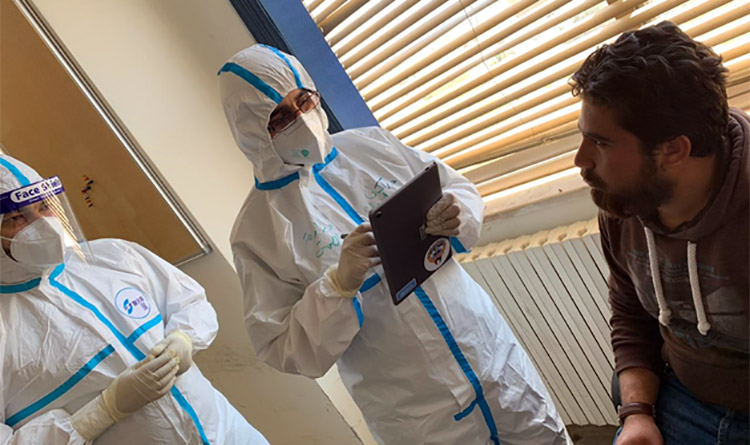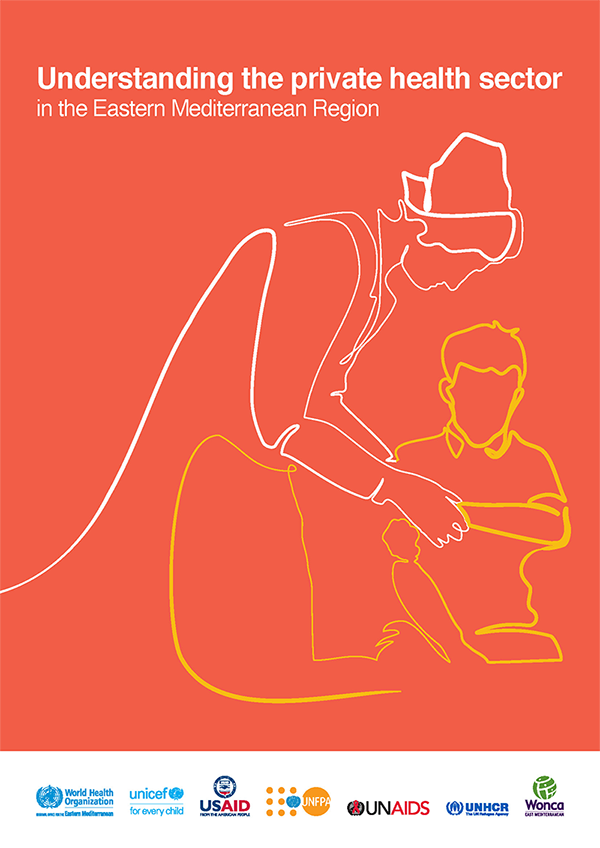Multiple commitments have been made regarding the advancement of private sector engagement for universal health coverage globally and in the Eastern Mediterranean Region. Those include resolution WHA63.27 by the World Health Assembly “Strengthening the capacity of governments to constructively engage the private sector in providing essential health-care service“ and resolution EM/RC65/R.3
Regional framework for action on private sector engagement
In October 2018, Member States adopted resolution EM/RC65/R.3 which endorsed a framework for action on effective engagement with the private health sector to achieve universal health coverage. The latter framework comprises 5 key strategies:
Developing policy frameworks
Implementing strategic purchasing
Improving quality of services in the private health sector
Ensuring effective enforcement of regulatory mechanisms in the private health sector
Developing monitoring and reporting mechanisms for private health sector providers.
Member States committed to:
integrating effective engagement with the private sector for service delivery into national policy, strategies and plans;
strengthening the capacity of the ministries of health to design, manage, monitor and assess effective engagement with the private sector providers;
encouraging contracting private health sector providers;
setting appropriate quality standards for all service providers; and
establishing health information systems for private providers that are linked with existing national health information.
Assessment exercise
Since the endorsement of resolution EM/RC65/R.3 that requested WHO to “support assessments to identify challenges and opportunities related to the engagement of private care providers in service delivery in order to develop strategic action plans for effective partnership towards achieving universal health coverage”, the Regional Office has been supporting Member States to undertake detailed assessments of the private health sector.
In-depth assessment of the private health sector
Assessment tool
The private health sector assessment tool was developed in 2018 to facilitate comprehensive, country level assessments of the private health sector. Based on the information collected, detailed country reports on the private health sector were prepared and policy options provided for engaging the private sector in support of national efforts to achieve UHC.
The tool contains a detailed list of information that is to be compiled in the form of factual and analytical information, numerical data and qualitative views and opinions of key stakeholders. Although effort has been made to include an exhaustive list of information categories (checklist), yet given that the nature, format and depth of information/data varies from country to country, the tool has been refined according to country context but was not fundamentally altered.
The employed assessment tool is divided into 3 parts: descriptive information; numerical data; and views, perspectives and opinions of key stakeholders.
Contact
This report aims to summarize the key findings from the 15 private health sector assessment reports, covering Afghanistan, Djibouti, the Islamic Republic of Iran, Iraq, Jordan, Lebanon, Libya, Morocco, occupied Palestinian territory (including East Jerusalem), Oman, Pakistan, Qatar, Sudan, Tunisia and Yemen. The reports were developed between 2019 and 2020.
Country assessments
Understanding the role of the private sector in the COVID-19 response

The COVID-19 pandemic triggered a global surge in demand for health services. As a result, countries are striving to increase their capacity to test, trace and treat COVID-19 patients while maintaining essential health services. In the current global context, the pandemic is overwhelming the public health system, and turning to the private sector for additional capacity has become an important part of the campaign to save lives.
WHO has developed interim guidance to help governments engage with the private health sector as part of a whole-of-society response to the pandemic and to seek its support in maintaining essential health services. The guidance emphasizes the importance of ensuring a coordinated response with actors in the private sector and civil society, and the need for governments to be creative in the types of partnerships adopted, flexible in their application of regulations, and strategic in their attempts to cover the costs.
In this context, the WHO Regional Office undertook a study exploring the role of the private health sector in the first year of the pandemic. The study covers 10 countries of the Region: Iraq, Islamic Republic of Iran, Jordan, Lebanon, Libya, Morocco, Palestine, Pakistan, Tunisia and Yemen.
This document aims to provide highlights of the country assessments of the involvement of the private health sector in selected response pillars
Regional assessment summary report
 This report provides a summary of the engagement with the private health sector in Iraq, the Islamic Republic of Iran, Jordan, Lebanon, Libya, Palestine, Pakistan, and Tunisia. The individual country assessments were based on desk review of peer-reviewed papers, technical documents and government reports. Insights from meetings, discussions and interviews with key stakeholders were also incorporated for further understanding of the existing situation.
This report provides a summary of the engagement with the private health sector in Iraq, the Islamic Republic of Iran, Jordan, Lebanon, Libya, Palestine, Pakistan, and Tunisia. The individual country assessments were based on desk review of peer-reviewed papers, technical documents and government reports. Insights from meetings, discussions and interviews with key stakeholders were also incorporated for further understanding of the existing situation.
The report is divided into 4 main sections. The first section provides a review of the national-level response to COVID-19 in the Region and details the level of involvement of the private health sector. The second section analyses the way the engagement of the private health sector correlates with the WHO action plan. The third section outlines the current policy challenges that hinder the engagement of the private health sector in the COVID-19 response. The report concludes with recommendations presented as a final section.
Role of the private sector in the provision of essential health services
Following the endorsement of resolution EM/RC65/R.3, the WHO Regional Office conducted multiple assessment studies. Among those studies was a series of thematic assessments, including the role of the private health sector in the provision of essential health services. The methodology used for developing the relevant reports was primarily desk review, with or without key informant interviews.
 In order to provide a comprehensive review of the role of the private sector in the provision of essential health services, a report was developed that summarizes and consolidates the work of the research team that worked on 6 different assessments. The assessments in question address the contribution of the private health sector to reproductive, maternal, newborn, child and adolescent health, noncommunicable diseases (NCDs) and mental health, communicable diseases and immunization, nutrition-specific interventions and emergency care services. The objective is to provide a concise version of key assessment results for easier reference by decision-makers in the Region.
In order to provide a comprehensive review of the role of the private sector in the provision of essential health services, a report was developed that summarizes and consolidates the work of the research team that worked on 6 different assessments. The assessments in question address the contribution of the private health sector to reproductive, maternal, newborn, child and adolescent health, noncommunicable diseases (NCDs) and mental health, communicable diseases and immunization, nutrition-specific interventions and emergency care services. The objective is to provide a concise version of key assessment results for easier reference by decision-makers in the Region.
For more information please contact:
Free online course
“Engaging the private sector to deliver COVID-19 tools and achieve Health for All”
On 20 January 2022, WHO launched the first online course on engaging the private health sector in the COVID-19 response.
The course is self-paced and has been accredited by the American Association of Continuing Medical Education. It aims to provide participants with practical tools to empower them to engage effectively with the different private sector actors in the COVID-19 response, and beyond.
The course has been developed for the COVID-19 taskforce at national and subnational level, policy-makers, health practitioners, academia, WHO staff and everyone working towards UHC and health security.









